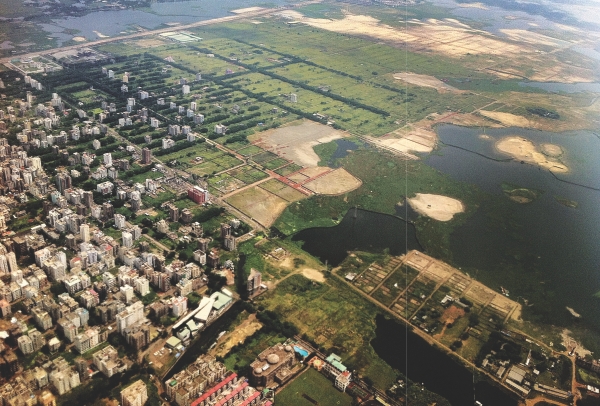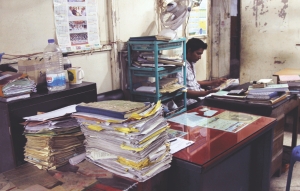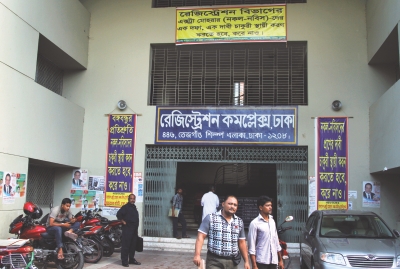| Home - Back Issues - The Team - Contact Us |
 |
| Volume 11 |Issue 34| August 31, 2012 | |
|
|
Special Feature Registering the Digital Way Akram Hosen If you have ever bought or sold a piece of land in or around Dhaka, you certainly know what it is like to be in the Registration Complex in Tejgaon. The two buildings (old and new) house 9 sub-registrars' offices, where thousands of people go almost every working day of the year to register their properties. One of the first things that you notice in these offices is that the digital revolution that has swept over much of the world, is yet to reach the premises of any of our 61 District Registrars and 476 Sub-Registry Offices situated all over the country except in three Hill Tract Districts. An obvious consequence of this is that people in these seemingly over-staffed offices are always seen to be working on registration of documents as old as five years. In a recent visit to the Registration Complex, this correspondent had found that land registration papers from 2008 are still “being processed”, although the Registration Manual of Bangladesh directs that the process should be completed in a month.
The amount of time-consuming manual jobs being done in these offices everyday is somewhat dismaying. Registration copy writers work doggedly on registration papers and valuable deeds in the gloom of the offices located in the barely ventilated old building. The copies of the registration papers they make are hoped to last for centuries. In fact, the ubiquity of age old papers on the rows of desks brings back to mind memories of offices in the past decades or the ones we read about in Dickensian novels. For record keeping purposes, no Registrar's Office in the country has ever used anything but pen, paper and manual labour. “The process of digitalisation has begun. In four months, the project will be implemented and the technologies will materialise in our offices,” says the Sub-Registrar of Sadar Record Room, Dhaka, Dipak Kumar Sarker, who is also a member of the project implementation committee (PIC) for digitalisation. In every office in the Registration Complex, roughly 60-70 people work at any given time of any working day. But an overwhelming majority of them do not have a full-time job in the Registrar's Office. “Much of our workload is outsourced to some 1,000 extra muhrer (registration copy writers),” says Sarkar.
Over the last few weeks, those 'outsourced' workers, some of whom are working there for more than three decades, have been demanding a full-time permanent job with a steady salary. Although their agendas have nothing against digitalisation of the registering process, it is understandable that they are partly anxious about being deemed redundant in future. “We want digitalisation of the offices, but we don't want to be unemployed with no pension whatsoever, especially after years of working for the government,” says Md Zoynal Abedin, president of the Bangladesh Extra Muhrer Association. Nevertheless, Abedin and other members of the association agree that the digitalisation will eliminate the ridiculously time-consuming registration process and put an end to the taxpayers' sufferings once and for all. Abedin asserts that the delay in processing the registration papers is not only caused by the absence of technology. Rather it is the inefficient management, lack of desks and chairs for the copy writers (extra muhrer) and irregular supply of papers for copying registration that delays the process. On the other hand, Dipak Kumar Sarkar, sub-registrar of Dhaka Sadar, alleges that it is the extra muhrers' unwillingness to work that delays the process. However, the sub-registrars, in general, hold that the outsourced workers' demands for a permanent job are not unjustified. Md Mahfuzur Rahman, Secretary General of Bangladesh Sub-Registrar's Association, says, “If it wasn't for them, we'd not be able to run the offices over the years without computers.” He is of the opinion that their demands are logical. However, he admits that after digitalisation, the need for a thousand “temporary” employees in the Registration complex will not be felt anymore. He is also quick to vouch for this government's reluctance to lay off any workers. The Project Implementation Committee is facing the dilemma between the need of modernising the single most important institution for land management, and its liability to retain the workforce. Dipak Kumar Sarkar says, “We are cautious about making any employee redundant after the modernisation.” To reach a possibly win-win situation for all, he informs that the institution stopped recruiting new extra muhrer six months ago. “Besides, we have introduced an exit point for the outsourced workers: people who are over 60 years old will have to retire,” he adds. The government also plans to train the workforce that has always been using pen and papers to make copies of registration papers for decades to use computer software, so that it won't need to recruit new people for the posts. It is understandable that even after digitalisation, all the extra muhrers will not be able to use the software efficiently. "They will be employed to continue their work with pen and paper, because we will continue the antiquated practice for a certain period of time as a necessary precaution," concludes Sarkar. Coming back to the plight of the day 'in day, day out' extra muhrer--who work on no work, no pay basis–they get Tk 15 per page for copying the documents. But the government charges Tk 25 per page from the general public for copying a registration document. Zoynal Abedin, the president of the Extra Muhrer Association says that the government can pay them a regular salary with pension without even having to take the funds from elsewhere, because the Tk 25 per page that it charges from the public is enough to pay them.
However, the de facto state of affairs in the registrar's office is not that the copy writers make only Tk 15 per page. The subtext is known to anyone who has ever registered his/her properties at a sub-registrar's office. The extra muhrers take Tk 500-1,500 for preparing each document of registration. “The government is always at least two months in arrears with our bills. Besides, with only the government bills, we don't make anymore than 8,000-8,500 every month,” Shagor says, when asked for his comments. He goes on to point out how impossible it is to survive with that meager income while the price of everyday essentials shoot through the stratosphere. It is not only the extra muhrer in the registrar office who are known for bribery. The sub-registrars also have a reputation for corruption. But it is hard to get anyone's comment on the matter. On conditions of anonymity, a group of extra muhrers inform that the sub-registrars and other officials skim off the top of the money they get from people. It is most likely that a tech-savvy registrar's office will make the registration of documents of transfer of movable or immovable properties much easier, less time-consuming and more efficient. But what is predictable is that the digitalisation will not save the general public from having to pay exorbitant sums for registration of their properties. Among other things, the government will have to rethink and restructure the salary scale of its employees if we ever hope to drive corruption out of our public institutions. It must also be noted that the Directorate of Registration is one of the most revenue-generating sectors of the government. In 2008-2009, the directorate declared a surplus of Tk 2571,63,92,000 by registering 27,00,574 documents. While we hope that the digitalisation will materialise soon, it is not desirable for hundreds of extra muhrer to become unemployed, not to mention the need to stop the corruption that has been overtaxing the general public for decades.
Copyright
(R) thedailystar.net 2012 |


